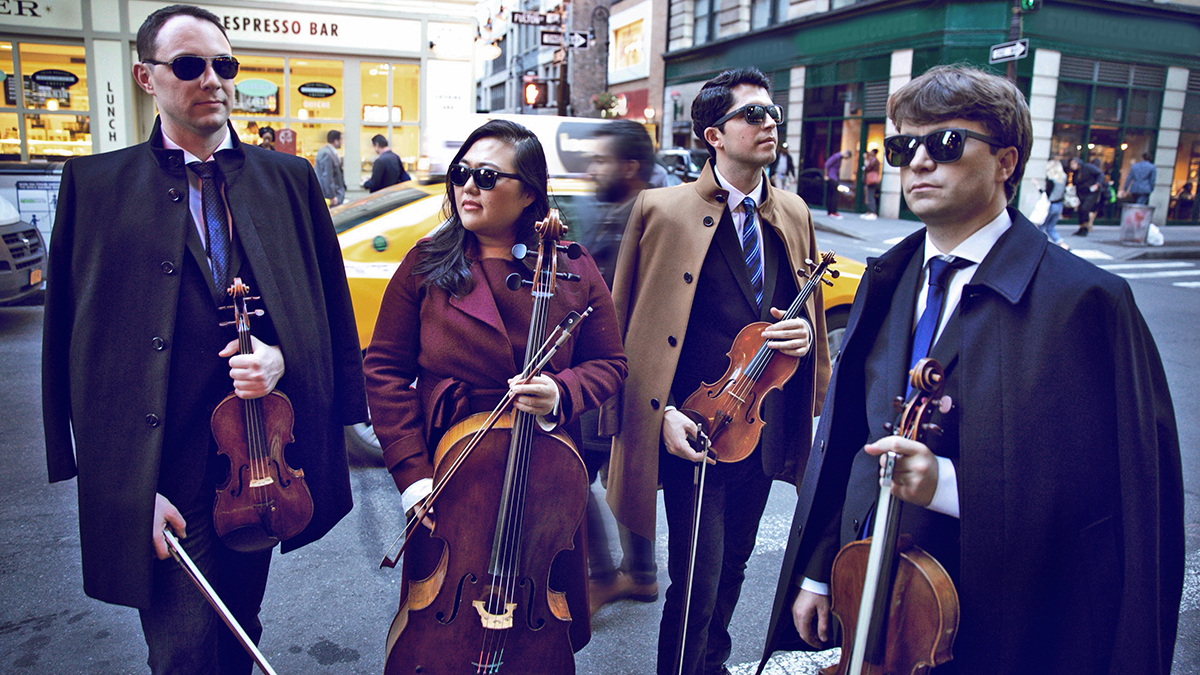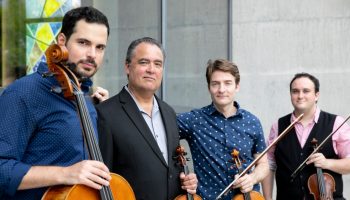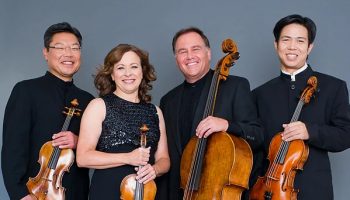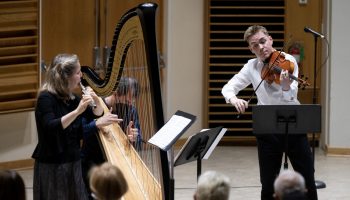Monday, Aug. 13, will be the Calidore String Quartet’s first time performing at Chautauqua Institution, but violinist Ryan Meehan knows the grounds well. He came here with his family starting at age 14 to study with the famous violin teaching duo, Roland and Almita Vamos.
It was intense, Meehan said — the young violinist had a lesson every day, so he spent most of his time practicing while his sister was at Boys’ and Girls’ Club having fun.
That practice has paid off for Meehan. At 4 p.m. Monday, Aug. 13, in Elizabeth S. Lenna Hall, he and the other three members of the Calidore String Quartet — violinist Jeffrey Myers, violist Jeremy Berry, and cellist Estelle Choi — will give a concert of the music of Beethoven, Haydn and Webern.
Calidore’s program Aug. 13 is a comparison of the two Viennese schools, Meehan said. The First Viennese School generally refers to Mozart, Haydn and Beethoven, three composers who helped to establish the language of tonal music. The Second Viennese School, most notably represented by Arnold Schoenberg, Alban Berg and Anton Webern, were pioneers of atonal music in the early 20th century.
On this afternoon’s program, the First Viennese School will be represented by Hadyn’s String Quartet in G major, op. 54, No. 1, and Beethoven’s String Quartet in C major, op. 59, No. 3, “Hero.” The second will be portrayed by Webern’s Langsamer Satz (“Slow Movement”).
Langsamer Satz is unusual, according to Meehan, because it’s much longer than most of Webern’s works (the composer was known for incredibly short compositions), and also because it bears little resemblance to the atonal music that Webern is most known for. The piece, Meehan said, is actually more of a Romantic work, likely because the composer was young and in love at the time of its composition.
After Meehan’s time at Chautauqua, he attended the prestigious Colburn Conservatory of Music in Los Angeles, where he met Myers, Berry and Choi. The group formed to fulfill a class credit and is now a world-class touring string quartet.
There’s no one way for a young string quartet to become a professional ensemble, but many groups try to do so by entering chamber music competitions. Important ears will hear their work, and top prizes can include concert bookings and professional management.
The Calidore String Quartet went that route, and it was successful quite quickly. Within two years after its formation in 2010, the quartet won most of the major U.S. chamber music competitions, including the Fischoff, Coleman, Chesapeake and Yellow Springs competitions.
After that, the group had professional management and a regular concert schedule. It wasn’t an easy life, Meehan said — the group had to split concert fees five ways (four musicians and a manager), buy an extra seat for the cello on flights and cover New York City rent — but there wasn’t much point in continuing to do competitions.
That is, until the University of Michigan announced the M-Prize for May 2016. The $100,000 prize was the largest ever for a chamber music competition, and at 172 applicants, it promised to be the most competitive, too.
The quartet decided it was going to come out of “competition retirement” to take a shot at the competition, for obvious reason.
“Whether you know about the classical music world or not, something about a $100,000 prize seems to resonate with our culture,” Meehan said.
They won, and that victory took the musicians from a respectable chamber music career to a sky-high one. The group’s resume looks like a read-out of classical music’s top venues, and it continues to receive accolades — most recently, Calidore earned a 2018 Avery Fisher Career Grant.
That success has certainly come as a result of the M-Prize win, Meehan said, especially because they won the prize in its inaugural year. But while the prize helped the quartet’s career, it didn’t change its mindset, according to Meehan.
“Not much changed about our attitudes after we won the M-Prize,” he said. “It helped us get where we already wanted to go, just faster.”





